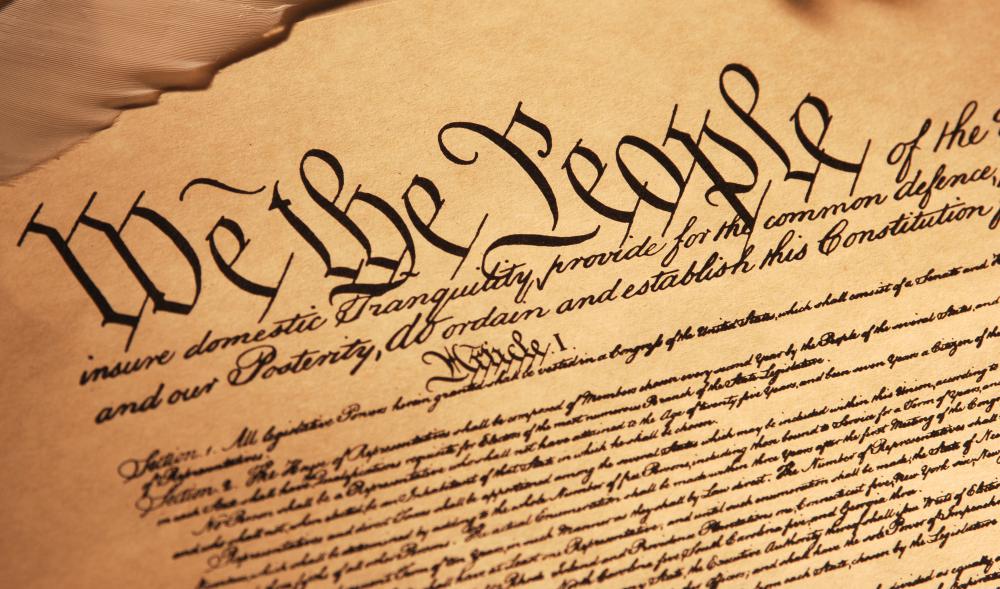At WiseGEEK, we're committed to delivering accurate, trustworthy information. Our expert-authored content is rigorously fact-checked and sourced from credible authorities. Discover how we uphold the highest standards in providing you with reliable knowledge.
What is Executive Privilege?
Executive privilege is a concept invoked by the President of the United States to avoid disclosing information which the President feels could compromise the workings of the executive branch of government. In strict point of fact, there is no Constitutional basis for this privilege, and some Presidents have lost their attempts to invoke it, including President George Washington, the first to attempt to use this concept.
The justification for executive privilege is that it is guaranteed by the separation of powers clause in the Constitution. According to this logic, if the President was compelled to reveal certain sensitive information by the judicial or legislative branch, this would be a breach of the separation of powers. Furthermore, executive privilege is also supposed to protect national security and the Presidential administration itself by ensuring that executive officials feel free to communicate with each other and the President about issues of importance.

The term “executive privilege” was coined by President Dwight Eisenhower, but he was far from the first or last to invoke this concept to evade testimony. In addition to the President, this privilege is also assumed to protect key members of the administration, including the Vice-President and other executive officials. In cases where officials evade testimony, executive privilege tends to be more widely accepted, under the blanket of executive immunity. In instances where Presidents and their administrations invoke it to resist warrants and avoid surrendering subpoenaed materials, they can face a battle.

In 1974, President Nixon attempted to invoke executive privilege and he failed. In addition to failing, he also brought the issue to the forefront of the American mind and to Congress, leading to the passage of a law which was designed to more clearly define and restrict this privilege. The concept continues to be invoked by Presidential administrations of all stripes, and it continues to be fought by the legislative and judicial branches of the American government.

Some people feel that executive privilege is appropriate, and that without it, the executive branch could be too exposed. Others feel that it is sometimes evoked to avoid the exposure of illegal activities in the White House, and that Presidents and other executive officials should be compelled to testify, submit to warrants, and comply with subpoenas. Like many contentious legal issues in the United States, the matter will probably never be satisfactorily resolved, much to the delight of the lawyers and judges who are paid to wrangle about such issues.
AS FEATURED ON:
AS FEATURED ON:














Discussion Comments
@Tomislav - What George Washington used his executive privilege (or tried to use his executive privilege) for was to avoid giving details of the Jay Treaty.
But the reason behind his avoiding of giving this information was not all that juicy, he had used his executive privilege it is thought because he thought that because the House did not take part in treaty-making then they did not need to know the details of it or something along those lines.
The Jay Treaty, was actually a rather important treaty, it settled some leftover issues following the American Revolution and it enabled positive trading to occur between the newly formed United States and Britain.
Any other more exciting attempts at uses of the executive privilege that were denied?
@SailorJerry - Well said ("Democracy - it's a messy way to govern but it beats the alternatives!")
What I would like to know is if it is on the record what George Washington was trying to withhold using his executive privilege when his executive privilege was revoked?
Was it something that was better off unsaid - I think my curiosity was peaked when it came to George Washington because of the legend about chopping down the cherry tree and the alleged honesty!
This sounds like a super-messy issue, but maybe it needs to be. The president does probably need to withhold some things, but he wouldn't be human if he didn't try to withhold some things that he shouldn't.
And Congress and the courts are going to want some things that they have a right to or that should be made public, but being human, they're also going to want some things that they shouldn't get access to.
So it has to all shake out on the courts and be worked out. I read that over the years, cases have gone both ways; George Washington lost the very first case, but since then sometimes the executive branch wins and sometimes it loses.
Democracy - it's a messy way to govern but it beats the alternatives!
Post your comments